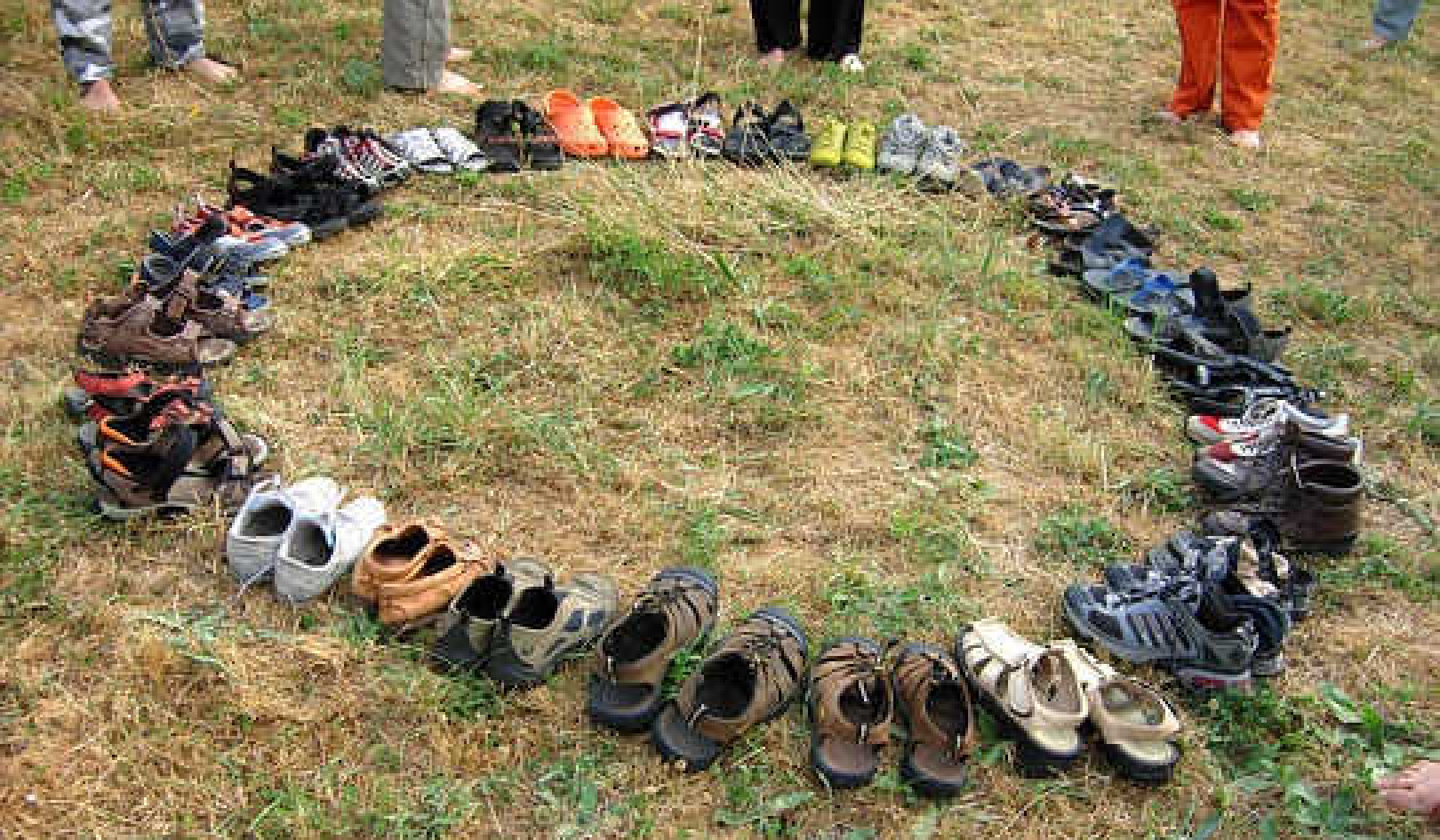
Think about your home, for a moment. Most of us would probably agree that there's an ideal amount of stuff -- furniture, knicknacks, decorations, art, towels, clothes, pots and pans -- when everything fits nicely. At some point, however, when you cross a certain line, the result is clutter. There's a point of diminishing return.
While some clutter might not be so bad, and we certainly all have our own tolerance levels, it's still fair to say that at some point it begins to interfere with the sense of order, beauty, and organization in our homes. It becomes too crowded and more difficult to find things. You end up misplacing your keys, wallet, and other important stuff because everything is such a mess. It becomes harder and harder to find places to put things, and it's much more difficult to keep the house clean. It's simply too full.
This is a great metaphor for the way we treat our minds as well.
Crowded Mind, Cluttered Mind
There is a huge tendency, in many of us, to have way too much going on inside our minds, at the same time. It's too crowded in there. After all, consider what we have happening within our individual heads at any given moment.
There are all the plans about our future. What are we going to do with our life? What's going to happen later today, next week, next month, and next year? How will we get all of our work done, get the kids to soccer practice, and pick up the dry cleaning, all before five? "Whoops, I forgot to call Bill," we think to ourselves; and, "I've got so much going on at work." Meanwhile, we're planning our son's birthday party and trying to remember where we put our receipts as tax time approaches! At the same time we're thinking, "How will I survive when I retire and get older? How will it all come together?"
In our minds, this can get very complicated and involved. Our thinking is relentless. Hundreds of thoughts and decisions about various things are all vying for our attention. There is conflict among our thoughts. "I want to buy the stereo, but I'm trying to save money." Then there are all those thoughts regarding what others think about us.
Too Many Things To Remember
There's also memory -- all the things that have happened to us in the past. There are the recent memories such as the argument we had an hour ago, as well as the long-term memories such as what happened to us when we were kids. Then there are our hour-to-hour schedules, our daily to-do list. Even if we have sophisticated electronic planners, we've got most of it in our heads as well. We're constantly altering this list as well as evaluating how we're doing. We add things, check off others, and make adjustments. Then there's good old-fashioned worry. What could happen to us -- what could go wrong? How can we prepare for the worst? Throw in a few resentments, goals, and fantasies, and pretty soon it's just too much.
The tricky part about detecting a busy mind on an ongoing basis and having the desire to get rid of it (or at least limit it) is that, first of all, it seems totally "normal." You've probably always had a busy mind but never considered it to be problematic. Plus, almost everyone else suffers from the same problem. Our minds are like sophisticated computers on information overload. Eventually our wires get crossed, which creates some sort of crash or malfunction! Most of us become so accustomed to it, however, that we don't give it a second thought.
Secondly, having a busy mind is not only socially acceptable but in many ways, it's also admired. We look up to people who "have a lot on their plates" and "many balls in the air." We might even be proud of the fact that we, ourselves, have so much on our minds at any given moment, and that somehow we can keep it all together. There's no doubt about it. It's tough to get rid of something that we admire.
Finally, a busy mind seems so necessary. How could we possibly function in our "busy" world with our "busy" lives if our thinking minds weren't going full steam ahead, every waking moment?
An Overactive Mind Can Be A Deceptive Mind
An overactive mind can be very deceptive. When something is bothering you it might, on the surface, seem obvious that the source of the problem -- the culprit, so to speak -- is whatever your attention is on at that moment. Suppose, for example, you have a fight with your spouse. She says something that bothers you, and you fly into a rage. Instantly, you react. You get caught up in the drama and even more agitated. Mentally you're arguing and rehearsing your responses. You're convinced she's to blame. You're right -- and she's wrong.
The question is, "Would you have been so easily bothered and reactive had your mind been clear and calm?" It's hard to know for sure, but it's certainly worth considering. As it was, your mind was probably spinning in a dozen different directions. You were tense and on edge before she made the comment that upset you. You felt pressure, and your head was full of concerns totally unrelated to your relationship with your spouse. Looking back, it's easy to see that practically anything could have set you off.
Think about the pressure of living like this -- your mind always full, constantly calculating. You've got it all, right there, on the surface. It's one thought after another, after another -- all day long. Like a mental game of Ping-Pong, your thoughts are flying back and forth. You are anything but centered.
The Benefits of Having Less On Your Mind
There are numerous benefits to having less on your mind at any given moment. The first has to do with the way you'll feel. As the sheer volume of data, information, planning, worries, figuring out, and wondering is reduced, even slightly, you will feel as though you've just stepped out of a dark cave and into the sunlight. You'll feel a sense of spaciousness, lightness, and freedom. To me, it's the mental equivalent of having a cluttered desk -- with papers and folders stacked to the ceiling -- suddenly cleaned up and organized. You'll feel a sudden sense of clarity, as if you can see light at the end of the tunnel; the forest through the trees.
You'll also become less tense and reactive. Because your mind will be quieter, you won't feel the impulse to "jump" at everything that goes wrong or is unexpected, or overanalyze every thought regarding the slightest hitch in your plans or expectations. You'll be able to pick and choose which thoughts to give significance to, which ones to honor with your attention, and which ones to attach less significance to, or to simply drop or dismiss.
One of my favorite metaphors on the subject of a busy mind is to think of an elevator that has reached its capacity of sixteen persons or 2,500 pounds. As long as the rule is honored and the number of people doesn't exceed the capacity, the elevator operates safely at a high level of efficiency. Although it's crowded in the elevator, it's not packed, and the passengers remain relatively comfortable. The riders continue to cooperate with one another, moving out of one another's way when necessary.
If you were to cram an additional twenty people into the elevator, however, all hell would break loose. The passengers would become irritated and edgy, and the elevator would no longer be safe. Riders would get in one another's way, and the sheer volume of passengers would endanger the very process of traveling up and down the elevator. There would be claustrophobia, anger, confusion, and chaos.
Our mind is similar to that elevator. There is an optimal level of mental activity whereby we remain relatively relaxed and operate at high efficiency. Life doesn't get to us too much, even when things go wrong or when the stakes are high. I know that when my own mind is free and clear, I can keep my perspective pretty well. I can receive what could otherwise be seen as "irritating news" and take it in stride. When my expectations aren't met, I'm usually able to deal with it. What's more, when "bigger," more significant things come up, I'm usually able to think clearly and responsively in the moment.
Thought Capacity on Overload?
When our "thought capacity" is on overload, however, the results can be, and often are, disastrous. Little things start to bother us. There is too much to keep track of, and we become frustrated and confused. On the surface, such small stuff might not seem that important, but cumulatively over time, it makes an enormous difference, especially when the stakes are high. Imagine the clarity and wisdom that are needed when we are dealing with really big stuff. A friend, for example, is hurting and needs help. If you have "a thousand things on your mind," how helpful are you going to be?
Suppose your bills are getting out of control and you're overextended financially. What you need most, of course, is crystal clear thinking. That way, you can make the needed adjustments and come up with an intelligent plan. What if, instead, your mind is filled with worries and overall busyness? You could easily panic and even exacerbate the problem with poor decision making.
I think of a busy mind as the early stage of nervousness, irritation, and stress. It's the breeding ground for overreactions and poor decisions. When looked at in this way, it's seen as being undesirable, which makes it easier to be motivated to turn down the volume and velocity of our thinking, to rid yourself of the grips of a busy mind. The key to calming down and quieting a busy mind is to trust that, if you do, everything will be okay. If you empty your mind, you won't be turning it off. It will still be working. In fact, it will be smarter and work better and more efficiently. A wise, intelligent, and orderly thought process will take over, and the appropriate thoughts will emerge when needed. As Joe Bailey and I discussed in our book, Slowing Down to the Speed of Life, it's comforting to remind yourself that when it comes to your thinking, "less is often more."
Making Space for Inspiration
You've probably had the experience of having an idea or solution come to you, as if from out of the blue. Out of nowhere, you have an insight; the perfect thought pops into your head at exactly the right time.
What I'm suggesting is that instead of these insights occurring randomly -- once in a while, by surprise -- we can learn to make them more of a way of life. Each of us has the capacity to learn to relate to life from a calmer, wiser perspective. Instead of being scattered and feeling rushed, we can operate from wisdom and feel peace. Trusting in our own innate intelligence instigates this process.
The implications of trusting in this process are invaluable. It suggests that we don't have to try so hard, every moment of every day. We can let go of the need to keep everything at the forefront of our minds at all times. Instead, we can learn to trust that if we relax, the appropriate thoughts and ideas will come to us at the right time. This doesn't mean we don't pay careful attention to our schedules, keep a day planner, or think things through. It has nothing to do with losing our "edge." In fact, any edge we have is greatly enhanced. All we're really doing is learning to let go of and release many of the thoughts that are weighing us down; the extra ones that we don't need at any given moment. It's like letting go of a tight fist or taking off a heavy backpack.
Useful Strategy: Beware the Burden of a Busy Mind
The way to begin is to pay calm attention to the level and volume of activity going on in your mind at any given moment. Simply pay attention. Don't judge what you observe, or be hard on yourself. As you spend time observing your own thinking, you will find yourself becoming more "present." You'll feel the peace that comes from training your attention to be where you want to be at any given time.
I titled this strategy "Beware the Burden of a Busy Mind" because being aware of the burden is half the battle. Beyond that, all that's necessary is to gently drop the thoughts that aren't needed at any given time. That's it: just notice them, and let them go.
Know that your thoughts will still be there, and that they will reemerge if and when they are needed. For example, in the conversation I just mentioned, I had confidence that if I dropped my "busy ness," meaning my unnecessary thoughts, and could simply focus on my current conversation, then when it was finished my memory would provide me with what I needed to do next. And that's exactly what happened.
A moment-to-moment busy mind is a huge burden. If you can limit this burden even slightly, you'll be amazed at this new source of creativity, as fresh ideas and insights become more common. As you trust in a quieter, less distracted mind, you'll also be amazed at how much calmer you can feel and how much more perspective you can develop. Then, when big stuff happens, you'll be ready. You'll be able to see exactly what is happening with heightened perspective, without the burden of dozens of smaller issues dominating your attention.
Over time, this awareness can become second nature, even normal for you. As you empty your mind in this manner on an ongoing basis, you'll create much-needed mental space that is the source of peace, insight, relaxation, wisdom, and happiness. As you create space between your thoughts, you'll find it easier to notice when there's too much on your mind.
I'm convinced that an overactive, busy mind is a true burden that interferes with our natural wisdom, common sense, and happiness. I hope that as you become familiar with the peace and joy that come from having less on your mind, you too will agree.
Reprinted with permission of the publisher,
Hyperion. ©2002. www.hyperionbooks.com
Article Source:
What About the Big Stuff?: Finding Strength and Moving Forward When the Stakes Are High
by Richard Carlson, Ph.D.
With more than 21 million copies in print, Richard Carlson's bestselling Don't Sweat series has shown countless families, lovers, and workers how not to sweat the small stuff. Now, in his soothing and wise trademark tone, Carlson takes a different approach and discusses life's bigger issues, including dealing with the death of a loved one; how divorce affects your family and friends; confronting illness, whether in yourself or others; and managing difficult financial situations. In chapters such as 'Bouncing Back from Divorce,' 'Finding Life After Death,' and 'Feel Free to Grieve,' Carlson offers healing insight and heartfelt advice on how to find inner peace and strength to deal with the big stuff.
Click here for more info and/or to order this paperback book or purchase the Kindle edition.
About the Author
RICHARD CARLSON is the bestselling author of Don't Sweat the Small Stuff at Work; Don't Sweat the Small Stuff for Teens; and Don't Sweat the Small Stuff for Men, among many other titles. Richard passed away unexpectedly on December 13, 2006. Visit the Don't Sweat website at www.dontsweat.com.
Books by Richard Carlson
at InnerSelf Market and Amazon





























